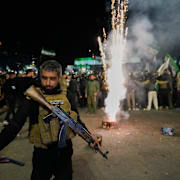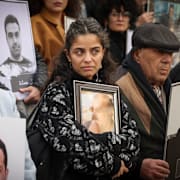
Källa bekräftar: al-Assad kommer att begäras utlämnad
Syriens tillförordnade president Ahmed al-Sharaa kommer att be Ryssland att utlämna den tidigare diktatorn Bashar al-Assad. Det bekräftar en regeringskälla för AFP.
al-Sharaa landade i Ryssland på onsdagen för möten med Vladimir Putin.
Den tidigare islamistledaren al-Sharaa tog över styret när al-Assad störtades i december i fjol efter 24 år vid makten. Bashar al-Assad flydde sedan till Ryssland där han hållit låg profil.
Förra veckan skrev den tyska tidningen Die Zeit att den tidigare diktatorn och hans familj bor i ett exklusivt lägenhetshus där de har tre våningar för sig själva. Enligt en av tidningens källor ska al-Assad ägna stor del av sin tid åt att spela spel på internet.
bakgrund
Bashar al-Assad
Wikipedia (en)
Bashar al-Assad (born 11 September 1965) is a Syrian former politician, doctor and military officer who served as the president of Syria from 2000 until his overthrow in 2024 after 13 years of civil war. As president, Assad was commander-in-chief of the Syrian Arab Armed Forces and secretary-general of the Central Command of the Arab Socialist Ba'ath Party. He is the son of Hafez al-Assad, who ruled Syria from 1970 to 2000.
In the 1980s, Assad became a doctor, and in the early 1990s he was training in London as an ophthalmologist. In 1994, after his elder brother Bassel al-Assad died in a car crash, Assad was recalled to Syria to take over Bassel's role as heir apparent. Assad entered the military academy and in 1998 took charge of the Syrian occupation of Lebanon begun by his father. On 17 July 2000, Assad became president, succeeding his father, who had died on 10 June 2000. Hopes that the UK-educated Assad would bring reform to Syria and relax the occupation of Lebanon were dashed following a series of crackdowns in 2001–2002 that ended the Damascus Spring, a period defined by calls for transparency and democracy. Assad's rule would become more repressive than his father's.
His first decade in power was marked by extensive censorship, summary executions, forced disappearances, discrimination against ethnic minorities, and extensive surveillance by the Ba'athist secret police. While the Assad government described itself as secular, various political scientists and observers noted that his regime exploited sectarian tensions in the country. Although Assad inherited Hafez's power structures and personality cult, he lacked the loyalty received by his father and faced rising discontent against his rule. As a result, many people from his father's regime resigned or were purged, and the political inner circle was replaced by staunch loyalists from Alawite clans. Assad's early economic liberalisation programs worsened inequalities and centralised the socio-political power of the loyalist Damascene elite of the Assad family, alienating the Syrian rural population, urban working classes, businessmen, industrialists, and people from traditional Ba'ath strongholds. Assad was forced to end the Syrian occupation of Lebanon during the Cedar Revolution in 2005, which was triggered by the assassination of Lebanese prime minister Rafic Hariri. The Mehlis report implicated Assad's regime in the assassination, with a particular focus on Maher al-Assad, Assef Shawkat, Hassan Khalil, Bahjat Suleiman, and Jamil Al Sayyed.
After the Syrian revolution began in 2011, Assad led a deadly crackdown against Arab Spring protests which led to outbreak of the Syrian civil war. The Syrian opposition, United States, European Union, and the majority of the Arab League called on him to resign, but he refused and the war escalated. Between 2011 and 2024, over 600,000 people were killed, with pro-Assad forces causing more than 90% of civilian casualties. Throughout the war, the Ba'athist Syrian armed forces carried out several chemical attacks. In 2013, the United Nations (UN) High Commissioner for Human Rights stated that findings from a UN inquiry directly implicated Assad in crimes against humanity. The regime's perpetration of war crimes led to international condemnation and isolation, although Assad maintained power with assistance from Syria's longtime allies Iran and Russia. Iran launched a military intervention in support of his government in 2013 and Russia followed in 2015; by 2021, Assad's regime had regained control over most of the country. In November 2024, a coalition of Syrian rebels mounted several offensives with the intention of ousting Assad. On the morning of 8 December, as rebel troops first entered Damascus, Assad fled to Moscow and was granted political asylum by the Russian government. Later that day, Damascus fell to rebel forces, and Assad's regime collapsed.
Assad's regime was a highly personalist dictatorship that governed Syria as a totalitarian police state. It committed systemic human rights violations and war crimes, making it one of the most repressive regimes in modern times. The regime was consistently ranked among the "worst of the worst" within Freedom House indexes. His supporters generally regard him as a determined leader who challenged Western imperialism, opposed Zionism, and resisted Islamic extremism.
Omni är politiskt obundna och oberoende. Vi strävar efter att ge fler perspektiv på nyheterna. Har du frågor eller synpunkter kring vår rapportering? Kontakta redaktionen



